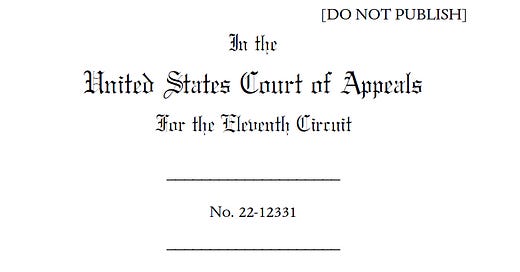Eleventh Circuit denies Andrew Allred habeas relief
In an unpublished unanimous decision, a panel of the U.S. Court of Appeals for the Eleventh Circuit affirmed the district court’s denial of Allred’s petition for a writ of habeas corpus.
Today, in an unpublished unanimous decision, a panel of judges of the U.S. Court of Appeals for the Eleventh Circuit affirmed the federal district court’s denial of Allred’s petition for a writ of habeas corpus.
Background
Allred pled guilty to two counts of first-degree murder and waived a penalty-phase jury. The trial court sentenced him to death on both counts. Allred’s convictions and sentence were upheld on direct appeal in 2010.
In 2012, Allred initiated state postconviction proceedings. In his motion, Allred raised ten claims:
Trial counsel provided constitutionally ineffective assistance by (1) failing to ensure Appellant received a reasonably competent mental health evaluation; (2) failing to investigate all circumstances bearing on Appellant's decision to plead guilty and advise Appellant accordingly; (3) causing Appellant to involuntarily waive a penalty phase jury; (4) failing to employ a mitigation expert; and (5) failing to investigate and present mitigation regarding Appellant's ability to adapt to prison life. In addition, Appellant argued that (6) the cumulative errors of counsel deprived him of a fair trial; (7) Florida's capital sentencing statute is unconstitutional on its face and as applied; (8) the Eighth Amendment prohibition of the United States Constitution on cruel and unusual punishment will be violated if he is incompetent at the time of his execution; (9) Florida's lethal injection method constitutes cruel and unusual punishment under the Eighth Amendment; and (10) section 945.10, Florida Statutes, which prohibits Appellant from knowing the identities of his execution team, violates his rights under provisions of the federal and Florida Constitutions.1
The trial court held and evidentiary hearing on the first three claims. Regarding his first claim, Allred’s trial counsel testified at the evidentiary hearing in part that “[h]e did not believe that another expert would have come to a different conclusion or bee able to provide mental health mitigation. He was also concerned about delaying the penalty phase to pursue other experts, given Allred’s hostility toward developing a mitigation case.” After a hearing, the state trial court denied Allred’s claims.2 On appeal, the Florida Supreme Court affirmed the denial.3
In January 2017, Allred filed a successive motion for postconviction seeking relief under Hurst.4 In November 2017, the Florida Supreme Court affirmed the trial court’s denial of the motion because Allred had waived the penalty-phase jury.5
Federal Habeas
Allred filed a petition for a writ of habeas corpus in federal court, “raising several claims, including a claim that trial counsel rendered ineffective assistance by failing to obtain a reasonably competent mental health evaluation.” The federal district court denied Allred’s claims.
The Eleventh Circuit granted a “certificate of appealability on his claim that trial counsel was constitutionally ineffective in two ways, for failing to (1) conduct a sufficient background investigation and (2) ensure a reasonably competent mental health evaluation for Allred’s penalty phase.” He argued in part that if trial counsel had presentenced “the testimony of a mental health expert, . . . there is a reasonable probability that it would have weighed the balance of aggravating and mitigating circumstances in his favor and sentenced him to life imprisonment instead of death.”
In its decision today, the Eleventh Circuit affirmed the federal district court’s denial of relief. The Court concluded that “the Florida Supreme Court’s determination that Allred was not prejudiced by his counsel’s failure to present the testimony of a mental health expert during the penalty phase was not unreasonable” and, therefore, the Court could not grant relief under the applicable standard. In other words, the Court determined that Allred did not prove he was prejudiced by counsel’s alleged failures.
The full decision can be downloaded here.
Allred v. State, 186 So. 3d 530, 534 (Fla. 2016).
Id. at 535.
See generally id.
Allred v. State, 230 So. 3d 412 (Fla. 2017).




